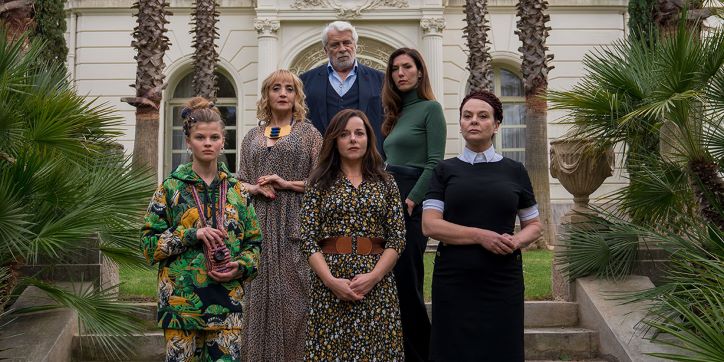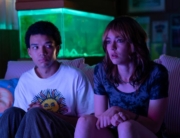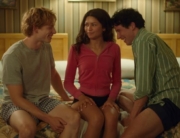![]() The title of French director Sébastien Marnier’s thriller may sound more appropriate for the title of a sermon, but be not afraid, those of little faith. His film is instantly engaging, freewheeling, and playful, mainly for the best use of split screen in a long while—it serves a purpose, to zero in on different individuals at the same time during pivotal confrontations. (Verbal bombshells will be tossed.)
The title of French director Sébastien Marnier’s thriller may sound more appropriate for the title of a sermon, but be not afraid, those of little faith. His film is instantly engaging, freewheeling, and playful, mainly for the best use of split screen in a long while—it serves a purpose, to zero in on different individuals at the same time during pivotal confrontations. (Verbal bombshells will be tossed.)
Marnier channels the spirit of Claude Chabrol’s withering knock-downs of the bourgeoisie, layered with the plot curves of a Hitchcockian riddle. At least, that is how his screenplay plays out, which steadily bares all (machinations, that is). Besides keeping count of the endless scams, it’s always up in the air whose motivations are above board.
Foremost, the movie celebrates acting, and indirectly, actors. The linchpin of the plot relies on the art of performance, pulling one over a mark or the audience, and the director has offered a whopper of a showcase for Laure Calamy (My Donkey, My Lover, & I). He gives her a movie star entrance in the opening sequence: As women are dressing, the camera roams up and down through a maze of lockers until it settles on a medium close up of the actress. (If you want to know who the hot directors are in the French film world as well as the most adventurous roles for women there, follow the careers of Calamy or Virginie Efira, also at the festival in Paris Memories and Other People’s Children.)
Without spelling out the title’s typical meaning, the source of all the onscreen trauma derives from money—and how to get it. From the onset, one could assume that the movie would be a contrast between the haves and the have nots. However, it is the rumbling, thunderous, ambient score by Pierre Lapointe and Philippe Brault that clues you in that something disturbing lies ahead.
Fortyish Stéphane (Calamy) works in a sardine packing plant, and is about to be kicked out of her shared rental (something to do with bad blood with another woman). Alone on her bunk bed, she slowly presses the numbers on her cell phone. After first hanging up, she calls back the number, and is barely audible: She would like to speak to Serge. She has a good reason to be nervous—she tells him she’s his daughter and she would like to finally meet him.
She takes a ferry from the mainland to the Mediterranean island of Porquerolles. Apparently, the father she never knew is doing quite well in the international restaurant trade, living in a palatial villa. At a meet-and-greet with her relatives, she lies, claiming to own a fish packing plant. The fib doesn’t help her ease suspicions—her chances of winning over the poker-faced women of the family remain a lofty and unreachable goal. In fact, her half-sister, George (Doria Tillier), abruptly tells her to leave and never come back. Adding to the Mandalay-like, cold mausoleum atmosphere is Agnès (Veronique Ruggia), the family’s servant and spy, always hovering in the background. In a touch that could have been borrowed from a Chabrol film, the well-furnished kitchen has a mini-garden of Venus flytraps, a visual metaphor if there ever was one, but the question is, who’s the predator and who’s the prey?
Part of the director’s sleight-of-hand is that a lot of the scenes are filmed from Stéphane’s perspective, yet as in many a good thriller, he withholds information, not only about her but her new family. The game of who’s playing whom continues to unfold well past the 90-minute mark. Unlike the average film, the nimble narrative’s tautness never flags. Even if viewers have a read on one character, another self-interested schemer comes along to turn the tables.
Apart from Stéphane, Marnier (School’s Out) offers two other great roles for women, including Serge’s longtime wife, the heavily accessorized and bleach-blonde Louise (Dominique Blanc, wonderfully flighty)—Serge will later confide to Stéphane that his wife spends 1500 euros a day on items she promptly discards. Last but not least, the formidable Suzanne Clément plays a woman Stéphane encountered under constricted circumstances. However, Marnier didn’t stint on the male lead, the mercurial Serge (Jacques Weber), who is frail and grandfatherly in one moment and as sinister as a hit man in the next.
Besides the devilish The Origin of Evil, it was a good year for female led films at TIFF this year. This group of various genres includes Causeway, Charcoal, Empire of Light, Love Life, Other People’s Children, Paris Memories, Women Talking, The Wonder, as well as the biographical documentary, All the Beauty and the Bloodshed.







Leave A Comment